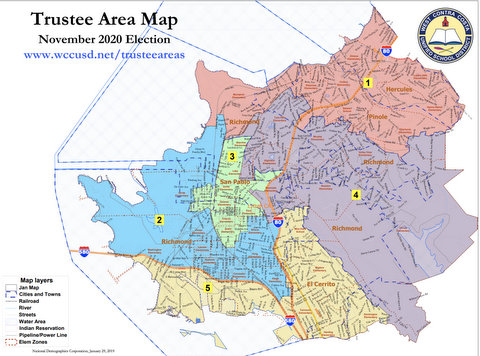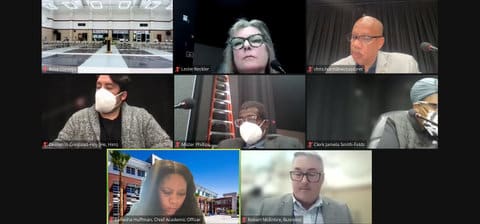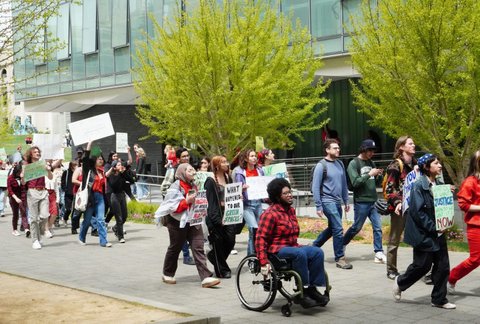
21 Sep School Board Candidates Call for Equity and Transparency

For the first time, members of the West Contra Costa school board will be elected by region, not districtwide.
By Edward Booth
The League of Women Voters held forums Sept. 12 to inform voters about 11 candidates running for the West Contra Costa Board of Education.
Members asked each candidate ten questions on topics including budget difficulties, charter schools, distance learning, the digital divide, campus security and equity.
Each candidate also gave brief statements.
For the first time, voters will elect members according to which of five regions they live in rather than by at-large voting in which candidates were chosen from voters across the entire school district.
Because of the change, no at-large members will remain on the board. Valerie Cuevas, Consuelo Lara and Stephanie Hernández-Jarvis, who were elected in 2018, won terms of two years instead of four as a result of the shift. None of them are running for re-election.
Of the districts up for grabs, District 1 includes Pinole and Hercules; District 2 runs through Central Richmond and includes North Richmond; District 4 includes Hilltop and El Sobrante; and District 5 consists of El Cerrito, Marina Bay and Point Richmond.
In District 3, which comprises San Pablo and a chunk of Central Richmond, current board member Mister Phillips is running unopposed. Phillips, who was elected in 2016, is a district parent and former district student. His priorities include parental involvement, student engagement, academic achievement, school safety and employee morale, according to his website.
An interactive map of the districts can be found on the WCCUSD website and video of the forums are on its Facebook page.
Read on to learn more about each district’s candidates, their backgrounds and their plans to improve West Contra Costa schools.
District 1
Running for District 1 are Jamela Smith-Folds and Estela DePaz.
DePaz said her appreciation for the American school system started in 1981 when her parents decided to emigrate from the Philippines to the United States. “My parents said if you get your diploma in America, no one can challenge it,” DePaz said.
In high school, DePaz attended the nearby John Swett Unified School District, which she said supported English as a second language students.
DePaz’s eldest son was diagnosed with a learning disorder that led to an individualized education plan with services including special day classes, occupational therapy and social learning.
“I’m completely convinced those special education programs changed the trajectory of his life,” DePaz said.
DePaz said the system is in crisis, pointing to the deficit and social inequities glaringly revealed by the COVID-19 pandemic. She called the board ineffective and said it should ensure students get the “quality education that is their right,” DePaz said.
Smith-Folds, born in Alabama, has been in education for more than 15 years as a teacher, parent volunteer and community leader. As a board member, she said, she’d work to ensure transparency and accountability and to make programs equitable and sustainable with room to grow.
“[For me,] school was a place where knowledge flowed like a river everyone could drink from,” Smith-Folds said. “Teaching in California and Alabama provided a clear awareness to me that my relationship with education was not everyone’s experience.”
Smith-Folds also has three school-age daughters. She said she knows as a parent volunteer what it’s like to fight for teachers, and as a teacher, how important it is to make space for student and teacher perspectives.
On the budget, DePaz said her experience as a project manager made her comfortable managing multimillion dollar projects. Smith-Folds said her priority was to continue providing services to students and families, to protect the integrity of education from hard budget decisions down the line.
“They cannot suffer from the gross mismanagement of the budget,” Smith-Folds said.
Smith-Folds said she wouldn’t approve new charter schools because she wanted to stop their impact on the budget. She added that she wants to hear why parents send their children to charter schools and implement those benefits — like safety or extra programs — in district-run schools.
DePaz said that although she didn’t support for-profit charter schools, she wouldn’t commit to denying a charter school organized by parents if they’re dedicated to putting together the program.
On campus security, Smith-Folds said the board made a “knee-jerk” reaction when they removed School Resource Officers. She said the district needed to implement a safety plan, and she would utilize the health department and create community relationships to help with safety.
DePaz agreed, saying the decision to remove SROs was “short-sighted.” She said the district needed a more systematic approach to safety, and recommended a community schools model where schools are built around partnerships with community resources.
DePaz said it’s important for her — as an immigrant and parent of a special-needs student — that a light be shined on all areas of inequity in the school system. To achieve this, she said, the board needs to engage communities to make sure needed conversations are happening.
On equity, Smith-Folds said the achievement gap is more of a chasm that students can only overcome with personalized attention. She chose to teach at the district’s Samuel Gompers Continuation High School, Smith-Folds said, to take voices from there to the school board and advocate for those who are historically marginalized.
“We have to be able to hit every student at the level they are and be a motivator and encourager,” Smith-Folds said.
District 2
Running for District 2 are Otheree Christian, Audra Golddie Williams andGuadalupe Enllana.
Christian said he cares about students in the district and wants them to succeed. He graduated from John F. Kennedy High School and was the lead campus safety officer at El Cerrito High School for 15 years, he said. He’s also served as president of the Iron Triangle Neighborhood Council and the Richmond NAACP.
“I have spent my career protecting children,” Christian said. “When children don’t feel safe at school, they don’t learn.”
Enllana said she’s a lifelong Richmond resident and former student in the district. She’s co-chair of the Richmond Fund for Children and Youth Oversight Board and vice chair of the district’s citizen bond oversight committee. She said her experiences as a student and parent in the district play a big part in her commitment to helping improve it.
“I am rooted in this community and have shown that through my commitment, participation and many years of volunteering in many different sectors in and outside the schools,” Enllana said.
Williams is co-chair of the African American Site Advisory Team. She has more than 30 years of experience in human resources as the owner of an HR consulting firm, she said, which specializes in diversity, equity and inclusion.
“Our children are not performing like they should. Our district is not performing like it should,” Williams said. “Change is needed, change is here, and I’m that change.”
To tackle the budget deficit, Williams said, community input and transparency are key. She said she’d hold the superintendent and staff accountable for accurate and timely budget reports. The budget needs to be presented simply and in multiple languages, so the community can participate in the process, Williams said.
Christian said the budget is in crisis because huge cuts have already been made to balance it this fiscal year, and, because of COVID-19, cuts will need to be made for next year. He said the district needs board members who will “get the job done.”
Enllana said the budget needs to be understandable for all stakeholders. The first step, she said, is figuring out where the district is and then the board and community can figure out where they want it to be, with the financial restraints they have.
“This is the time to listen and really address the issues,” Enllana said.
Asked how they would prioritize the $575 million in bond funds passed by voters earlier this year, Christian and Williams said the focus should be rebuilding Richmond schools. Enllana said the board should update the district’s facilities master plan, which was passed in 2016.
Williams said Richmond schools have been overlooked when it comes to construction spending. It’s clear students perform better when their school environment is inviting, she said.
“In the same district, we have schools that look like they should be on the front of a magazine, and then we have classrooms that don’t even have windows,” Williams said.
Christian said he wanted to make sure Richmond students get nice schools with windows and clean air.
Enllana said increased oversight, and data from that oversight, would tell the community what it needs to know about how local charter schools operate.
“We have been overwhelmed by charter schools and applications into this district,” Enllana said. “If the charter schools we currently have are working now for our district, why do we keep adding more?”
Christian said the district didn’t need any more charter schools and district-run schools needed to bring in arts, trades and anything else to help inspire students.
“Every student has what it takes to make it,” Christian said. “Every student has gifts; every background has gifts and talents.”
Williams said the district primarily should comply with legal obligations, and secondarily should prevent harm to the community and students.
District 4
Running for District 4 are Y’Anad Burrell, Demetrio Gonzalez-Hoy and Matthew Trujillo.
Burrell said she’s a 25-year resident of Richmond with 20 years’ experience in strategic development, fund management, executive leadership, and equity, diversity and inclusion, among other fields. All this, she said, grounds her in a perspective different from that of most other candidates.
Burrell said students deserve representation “where every action taken is through a student-centered lens,” she said. She emphasized that students need equitable access and opportunities.
Gonzalez-Hoy said he deeply cares about education in the district as he and wife have both have taught in it and he was president of the United Teachers of Richmond for four years. Gonzalez-Hoy attended most school board meetings over that period and often worked with the board and district staff.
Trujillo, an environmental scientist and former teacher, said he values education because it made his career possible, and is troubled by the performance of district students.
On the budget, Burrell recommended the board figure out how the district got into a crisis in the first place. She recommended a forensic audit, which would account for every line item in the budget. Burrell also recommended partnering with the tech industry, which she said she had connections to, to get funding to meet students’ needs.
Trujillo said he agreed the district needed a forensic audit but didn’t think it was a good idea to cut spending, particularly to critical services, before the district knew more about the budget.
“While it’s a great idea to take a look at what’s been done already in terms of assessing how we’ve got here, I think we need to continue spending at current levels until we’ve gotten a complete picture about what the problem areas are,” Trujillo said.
Gonzalez-Hoy said he’d been working on the budget deficit since the district became aware of it two years ago. He recommended accountability so departments and schools couldn’t overspend, making sure the superintendent and district follow budget priorities, and that the citizen transparency tool, which gives monthly updates on the budget, be continuously updated to rebuild community trust.
He also said every school needs specific support for its individual needs. Gonzalez-Hoy recommended the district listen to educators, students, staff and families to figure out those needs.
He said he’d seen inequities in the district from the day he started teaching.
“We have to do better,” Gonzalez-Hoy said. “Our African American [students] and English Language Learners are falling through the cracks because adults in the system are not making the right decisions.”
Burrell said the district clearly recognized there were problems with equity, but solving them would require more than conversation. She recommended addressing access, curriculum, programming and diversity of teachers specifically and with equity in mind.
Trujillo said the district needed to start by addressing language access, as a huge portion of the student body comes from households where English isn’t the primary language. This affects not only learning, he said, but community engagement and which populations are served by the districts.
“People who speak different languages are often ignored and their needs are not met,” Trujillo said.
He also said cultural humility needed to be a focus of teachers and staff, as students are too often judged by their skin color or accents. Recruiting teachers of color would help solve this, Trujillo said.
Trujillo said he would be open to new charter schools if they could meet rigorous standards set by the board.
Burrell said she supported a moratorium on charter schools in the district. She said charter schools hurt the budget, and the district should prioritize helping schools most in need — such as Kennedy and Richmond high schools.
Gonzalez-Hoy said he wouldn’t support the expansion or addition of charter schools. He co-wrote a resolution last year asking the state to enact a moratorium on new charter schools. Gonzalez-Hoy said he’d seen the impact of charter schools opening up the hill from the school he taught at.
“They did not take our special education students. They did not take our African American students. They did not take our English Language Learner students or newcomer students,” he said.
Gonzalez-Hoy said charter schools coming into the district now try to privatize education, which hurts public schools. He said he wouldn’t blame any parent for choosing to send their child to a charter school, but the district needs to make its schools better by listening to parents and students.
District 5
Running for District 5 are Carolyn Wysinger, Leslie Reckler and Tom Panas.
Panas, a current board member, said he’s been exploring the ins and outs of the district for over 30 years. Both of his children are on the autism spectrum, he said, went through district schools and often had to change schools.
Reckler, who has children in local public schools, said she wants parents better represented. Only one school board member has children enrolled in the district, she said. Reckler has worked on school funding measures, including the recently passed bond measure, and the district’s positive school climate resolution. She also said she has 20 years of experience in business and managing large budgets.
Wysinger has been a student, a classified worker and a teacher in the district. She said the board needed to talk about the digital divide and career and educational pathways for students, and use the COVID-19 pandemic as an opportunity to reimagine the district.
“It’s not about reopening schools. It’s about looking at what our education will look like in the future,” Wysinger said.
Reckler said there weren’t any easy fixes for the budget, particularly because the state controls how much money the district receives. She said residents could help by voting for Prop. 15, which would raise millions of dollars for schools, and completing the census.
Reckler’s suggestions included accessible budget presentations and increasing enrollment by enacting new school programs and by exploring revenue opportunities with the district’s unused properties.
Wysinger said the first thing to do on the budget is figure out the district’s priorities.
Panas said the budget for fiscal year 2021-22 should be created with the community. As a retired certified public accountant, he said he’d helped catch errors in financial reports and bookkeeping while on the board. He also asked that staff provide reports to the board to allow for greater transparency.
On equity issues, Panas said his priority was making the district completely anti-racist. He proposed listing equity impact alongside board agenda items the same as financial impact.
Reckler said she realizes she has benefited from a white supremacist system, and that white parents have a lot of benefits and entitlements that other parents don’t. She said she’s worked to create equity among parents for years.
“I come to this work as a learner. I have a lot to learn,” Reckler said. “I try to be the quietest voice in the room and sometimes, I apologize, I cannot hold back. But I do it with love.”
Wysinger said her first way of supporting equity is running for the board. She said the district needed to do a better job of bringing people of color to the table and applying critical race theory.
“It’s very disturbing to me that there have been Black and Brown teachers, such as myself, who have been talking about race and equity for years in West Contra Costa,” Wysinger said, “And we are just now having board members who are learning what it is to be anti-racist. It’s not enough to just be learning what anti-racism is right now.”
On charter schools, Panas said, as a parent of children who were in special education, it isn’t his place to take away any parent’s right to choose where they want their child to go. He said he’d voted to approve three charter schools and to oppose two. His primary goal on the board, he said, is that all students go to high-achieving schools.
Wysinger said she supported asking the state to establish a moratorium on new charter schools. Even so, she said, there need to be better conversations about the difference between for-profit charter schools and grassroots charter schools such as the Oakland Community School run by the Black Panthers in the 1970s.
Those unwilling to have that conversation, she said, “don’t know a thing about Black education and liberation.”
Wysinger said that, according to Ericka Huggins, a founder of the school: “They created the Oakland Community School not to be in competition with the public schools, but to be a template for what a school could be with more empathy toward the child.”
Reckler said she was disappointed the board hadn’t listened to why parents and students were choosing charter schools. She said they knew parents were interested in safety, rigor and programs, and she would work to add all that to district-run schools.
As a board member, Reckler said she would ask how we get those families back.
Read more about the move to district elections on the WCCUSD website: wccusd.net.





No Comments